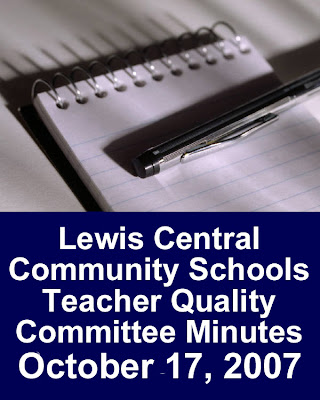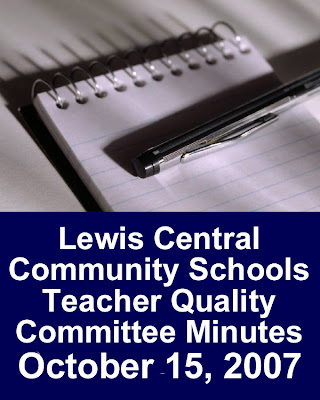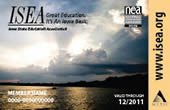
LEWIS CENTRAL
Teacher Quality Committee—Official Meeting Minutes
Educational Resource Center
Wednesday, October 17, 2007
1. Call to order and roll call at 4:30 p.m.
Present: Dave Black, Jeanne Bartholow, Laurie Thies, Kim Jones, Kim Muta, Tom McLaughlin, Barb Motes, Pat Thomas, Al Lorenz, Linda Hahn, Barb Grell (left at 6:00), Marilyn Wandersee, Mark Schweer
Absent: Sean Dunphy, Kent Stopak, Chuck Story
2. Approval of the October 17, 2007, agenda
Kim Muta asked to add to the agenda a discussion of the minutes and how they will be taken. Voice vote passed the agenda as amended.
3. Review Board Presentation
Barb Motes said that she thought the individual building administrators would present plans. Tom McLaughlin said that he had a good picture of the district-level plan, but not about the building plans. Dave Black said that the district-level look was intentional, as the Board was the primary audience for that report. Mark Schweer added to that point, explaining why the presentation was done this way. Marilyn Wandersee asked if Dave Black could pull out the individual items in the presentation and break them down by building. He pulled up the presentation for discussion, and the Committee reviewed the individual pieces of professional development—specifically, where they are occurring and what they are.
4. Professional Development Allocation
The Committee discussed what kind of information is necessary in order for the decision to be made about allocation of the PD funds. The Committee decided to meet (or attempt to meet) on Wednesday, October 25, 2007, at 4:30.
5. Review Remaining Tasks—Tabled until a future meeting.
* Ensure that the negotiated agreement determines the compensation of the teachers on
the committee
* Monitor PD (Professional Development) plans
* Determine the use and distribution of 277 PD funds—For our information, Dave Black
shared that one day of District PD costs more than $53,000.
* Monitor implementation of SF277 with regard to Chapter 20 (negotiated agreement)
* Recommend market factor incentives to the Board and LCEA—With last year’s
money, the total for this pot of funds is approximately $34,000.
6. Schedule Remaining Meetings—Tabled until a future meeting.
7. Taking Minutes
The Committee discussed possibilities for sharing or delegating the responsibility, and decided to share it, alternating between teachers and administrators.
8. Adjournment
Jeanne Bartholow moved that the meeting be adjourned at 6:40.












.jpg)





















